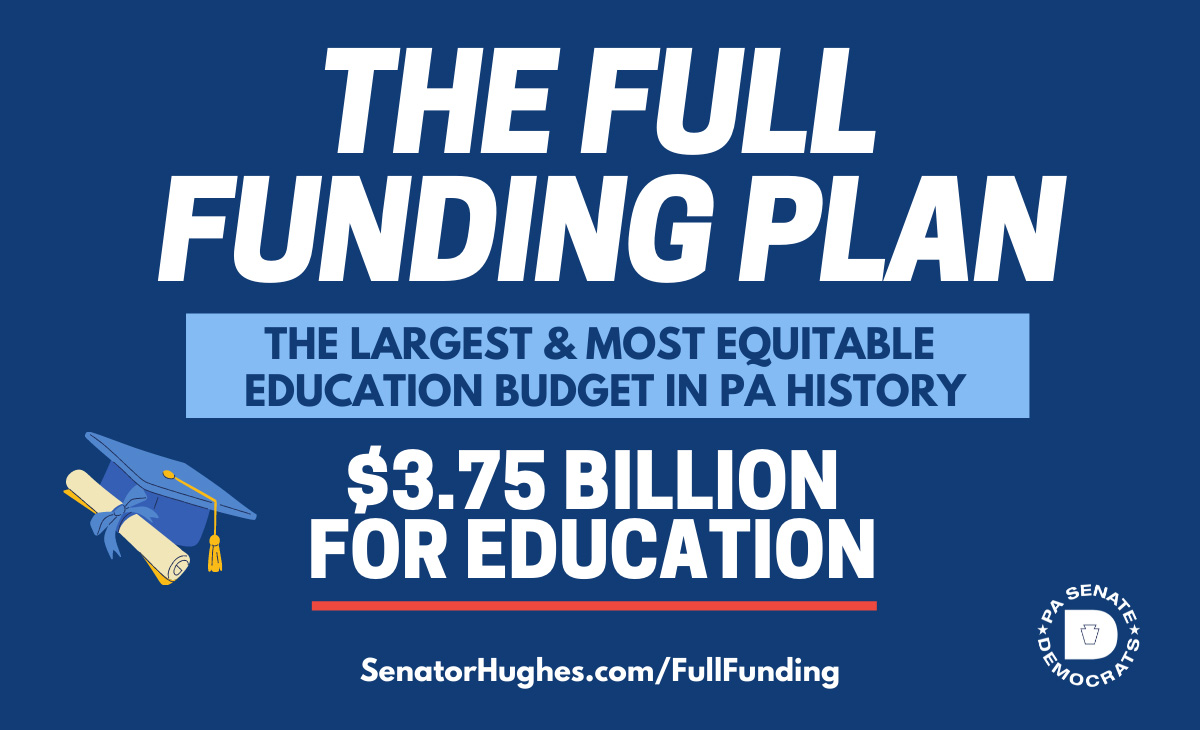 Harrisburg, PA - 31 de enero de 2022 - El senador estatal Vincent Hughes, junto con los demócratas de la Cámara de Representantes y los defensores de la educación, anunciaron hoy un plan de presupuesto escolar que representaría la mayor inversión en educación pública en la historia de Pensilvania.
Harrisburg, PA - 31 de enero de 2022 - El senador estatal Vincent Hughes, junto con los demócratas de la Cámara de Representantes y los defensores de la educación, anunciaron hoy un plan de presupuesto escolar que representaría la mayor inversión en educación pública en la historia de Pensilvania.
El proyecto de 3.750 millones de dólares, bautizado como Plan de Financiación Completa, aprovecharía los 6.000 millones de dólares de saldo final del Estado previstos para hacer frente a la desigualdad generacional, el deterioro de las infraestructuras escolares y los problemas de personal agravados por la pandemia.
"El insuficiente y desigual sistema escolar de Pensilvania fue puesto bajo un duro foco de atención por la pandemia, poniendo en el punto de mira las luchas a las que se enfrentan estudiantes, padres y profesores en distritos infradotados", dijo Hughes. "Ahora tenemos una oportunidad histórica para corregir ese legado y proporcionar a cada estudiante los recursos y las oportunidades que se merecen".
El plan realizaría importantes inversiones en los siguientes ámbitos:
- 1.100 millones de dólares a la Fórmula de Financiación Justa
- 750 millones de dólares para Level Up (destinado a 200 distritos con la financiación más desigual y la mayor brecha de adecuación).
- 1.100 millones de dólares para rehabilitar escuelas tóxicas
- 250 millones de dólares en problemas históricos de personal
- 125 millones para ayudas a la salud mental
- 100 millones de dólares en ayudas académicas
"Confiamos en la sostenibilidad de este plan porque Pensilvania está experimentando un superávit de ingresos sin precedentes debido a un enorme giro económico ayudado por las inversiones federales", dijo Hughes. "No puede haber más excusas para las escuelas tóxicas y la desigualdad de oportunidades. Estamos sentados sobre la mayor reserva de fondos no gastados en la historia de Pensilvania".
Hughes, presidente demócrata del Comité de Asignaciones del Senado, dijo que los ingresos del Estado están en camino de superar las estimaciones en más de 2.000 millones de dólares, mientras que casi 2.200 millones de dólares de los fondos del Plan de Rescate Americano siguen sin utilizarse.
"Ha llegado el momento. Es el momento adecuado", dijo el senador Jay Costa, líder demócrata. "Los recursos están ahí, y nos corresponde a todos hacer una declaración significativa sobre las medidas que debemos tomar para financiar adecuadamente la educación pública".
Los fuertes ingresos de Pensilvania, combinados con las ayudas federales, arrojarán un saldo a final de año muy superior a los 6.000 millones de dólares.
"En este ejercicio presupuestario confluyen la oportunidad y la necesidad", declaró el diputado Matt Bradford, presidente demócrata del Comité de Asignaciones de la Cámara de Representantes. "Tenemos un superávit histórico que se traduce en miles de millones de dólares en ingresos, lo que representa una oportunidad. También tenemos la necesidad de abordar nuestras escuelas públicas histórica y crónicamente infradotadas. Podemos hacer un pago inicial significativo y finalmente tomar medidas serias para cerrar la brecha de adecuación para nuestros estudiantes. Este tipo de inversión tiene un efecto transformador cuando disminuimos la carga que soportan los contribuyentes locales y posibilitamos el verdadero crecimiento económico necesario para revitalizar las comunidades."
La senadora estatal Lindsey Williams, presidenta demócrata de la Comisión de Educación del Senado, afirmó que el alcance del plan va mucho más allá de los ladrillos y el mortero para incluir ayudas a los profesionales de la educación.
"Estamos sentados en una oportunidad única en la vida para invertir fondos federales y un excedente de fondos estatales directamente en la próxima generación - estos son nuestros futuros médicos, enfermeras, maestros, ingenieros, consejeros y comerciantes - debemos aprovechar este momento", dijo el senador estatal Lindsey Williams, Presidente Demócrata de Educación. "Los últimos tres años nos han demostrado que nuestras escuelas son en muchos aspectos la piedra angular de nuestra sociedad - y para una sociedad mejor, debemos invertir en nuestro sistema de educación pública. Al centrarse en la contratación y retención del personal, el desarrollo profesional y la dotación de personal de apoyo de salud mental podemos asegurar que todos los distritos a través de Pennsylvania puede proporcionar a los estudiantes los recursos que necesitan para tener éxito."
El senador Tim Kearney, en cuyo distrito de los condados de Delaware y Chester se encuentra William Penn, uno de los distritos escolares que encabeza la demanda sobre financiación escolar que se está juzgando en el Tribunal de la Commonwealth, dijo que el plan podría suponer un cambio histórico.
"Todos los niños de la Commonwealth merecen una educación pública de calidad y un entorno de aprendizaje seguro", afirmó. "Estoy orgulloso de ser parte de la defensa de este plan, ya que aborda las desigualdades de larga data al tiempo que adopta un enfoque holístico para proporcionar a nuestros estudiantes los recursos que necesitan para sobresalir académicamente."
El senador estatal Jim Brewster, que forma parte del Comité de Seguridad Escolar de la Comisión de Delincuencia y Crimen de Pensilvania, afirmó que la financiación inadecuada de las escuelas y la desinversión en comunidades con dificultades son la raíz de numerosos y costosos problemas sociales.
"No podemos abordar eficazmente la delincuencia o la violencia sin invertir en las escuelas con dificultades y cerrar la brecha de oportunidades en la educación", dijo. "En muchos barrios, la escuela es el refugio seguro y el recurso de primera elección para las familias desfavorecidas. Este plan es una oportunidad para crear realmente el sistema "completo y eficiente" de educación pública que exige nuestra Constitución."
Más información en https://www.senatorhughes.com/fullfunding/
